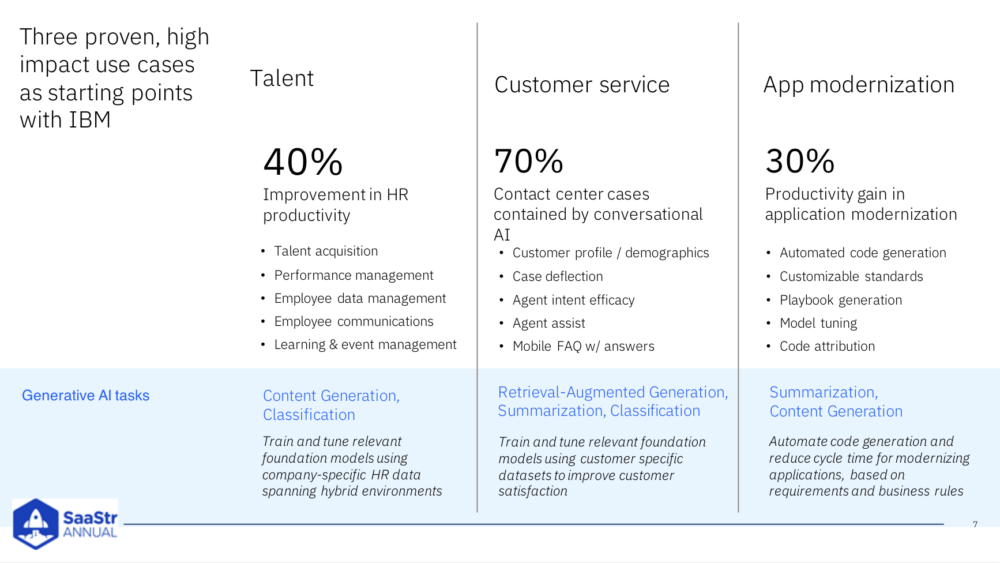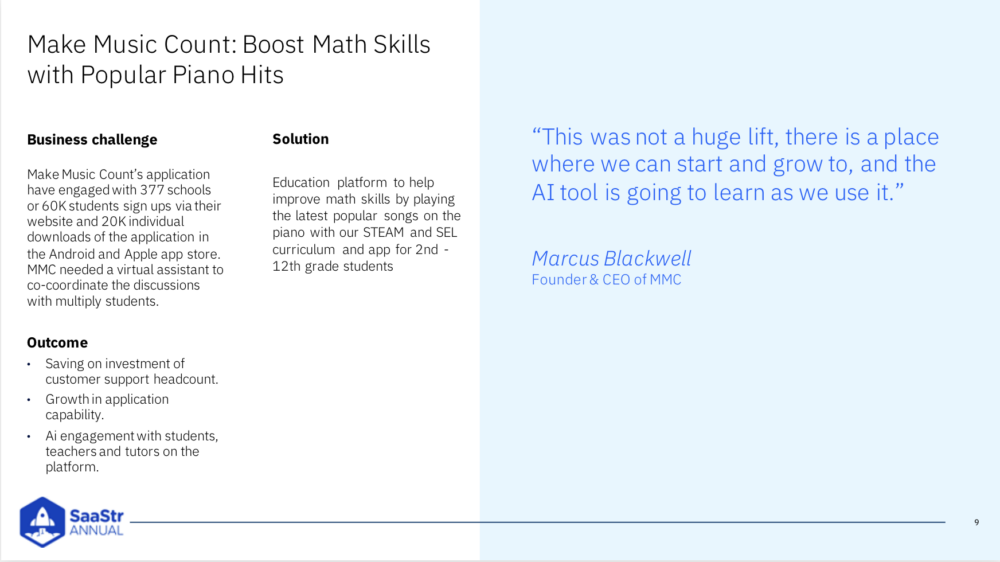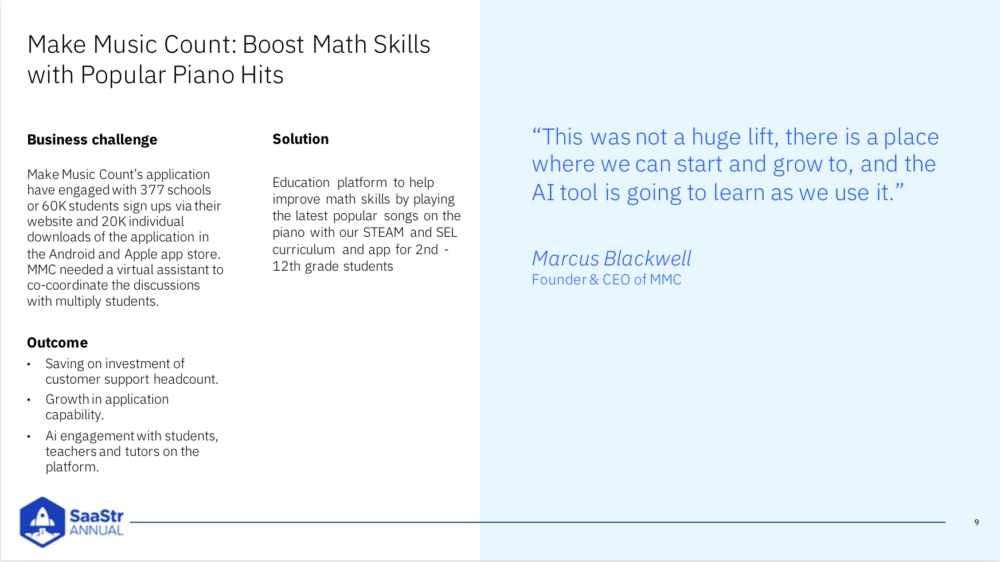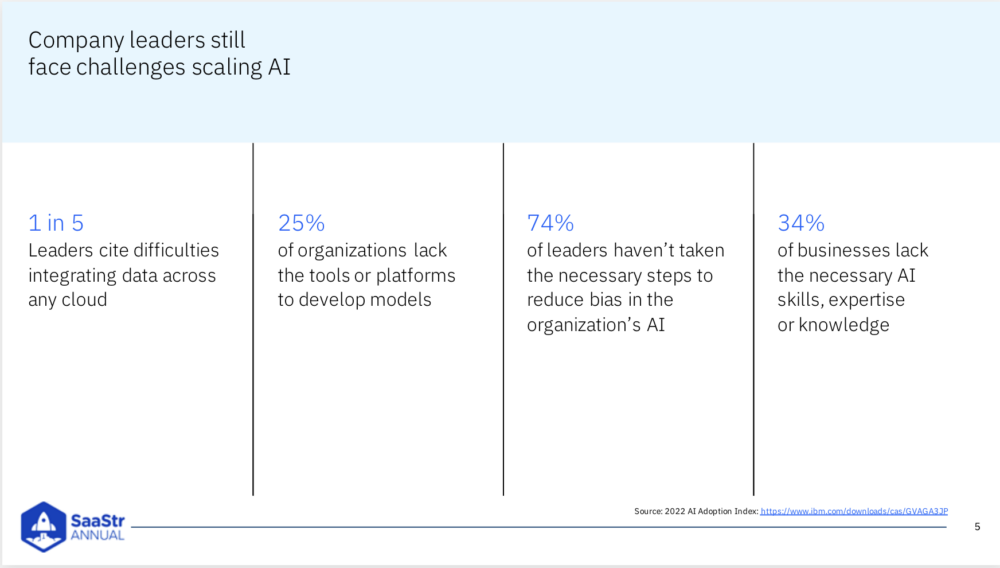Insights from SaaStr Annual from one of our top partners, IBM. To partner with SaaStr, contact us here!
….
AI adoption has grown exponentially over the past year and it has likely doubled from its more than 2.5x growth in the last few months alone. At SaaStr Annual, IBM’s VP of Software and Technology Raj Datta and Director of Startups Kylie Rutherford shared how AI is changing the game for companies of all sizes.
AI is a very competitive landscape, so startups have to ask themselves how they’re going to gain a competitive advantage with it.
Facing Challenges Scaling AI
86% of CXOs say they will adopt AI and need it to move forward because it’s critical to their business. Yet, 79% will struggle to ensure their AI models are responsible, secure, and free of bias. Security is all about where data is coming from and how you’re training your models. AI has been with IBM for 20 years, and now they have Enterprise-grade software. Meanwhile, many earlier-stage companies are running into biases and issues with modeling.
Organizations want to embrace AI, but they don’t have the right skill sets to get there, with 34% of businesses lacking the knowledge for it.
At IBM, however, over the last month, across 200k plus employees, they’ve had everyone creating their own AI applications using Watson X because they want everyone, regardless of company size, to be able to use it.
As leaders adopt AI, they need to focus on three simple areas.
- How to create a competitive advantage. Every software company is trying to do this, and it is the most critical area to focus on.
- How to scale AI across your business.
- How to advance trustworthy AI, i.e., compliance, security, and ensuring the AI software you put out there is responsible.
There can be resistance to AI because of a lack of knowledge or skills, but change is inevitable. As you read through a couple of use cases below, consider the necessary changes you need to make to grow. If you’re not doing it today, your competitor definitely will be. So, how do you build for tomorrow so that when you land those bigger deals, you can scale up rapidly?
High-Impact Proven Use Cases with AI
IBM has three high-impact, proven use cases for AI.
- Talent
- Customer Service
- App modernization

Talent
None of us can build a successful company without thinking about talent. But acquiring the right talent is a difficult task. How do you reduce bias in hiring talent? What are the steps to build a rockstar team? There’s a level of productivity you can improve by leveraging AI with things like content generation. AI can build job posts for you, proofread, edit, and update verbiage.
For example, IBM has an HR chatbot that resolves 70% of employee cases that would typically require a person, which leads to the next use case.
Customer Service
A lot of questions people ask are repeatable, which is important when looking at a customer service landscape. There’s usually a support, help desk, or agent management happening. You can modernize that process and save a lot of money while also making it possible to reach a person if needed.
App Modernization
You’re already building for the modern environment, so why not automate code generation? Things like code assist and automating the code design help you use your developer organization more wisely.
Use Case #1: Ovum Medical
Let’s look at two companies using IBM’s AI to scale their business. The first is Ovum Medical, a MedTech startup focused on the sensitive topic of solving problems around fertility. People who have been trying to get pregnant for a long time are vulnerable and require a certain amount of empathy. Can you train an AI bot to be empathetic?

You can. Sentiment can be trained in the models and was, allowing this company to scale 60k patients, resolve questions, and enable patients to schedule appointments, all with a necessary dose of empathy from the AI model.
Use Case #2: Make Music Count
Make Music Count is another tech product, and it’s focused on making math fun for students through music.

The challenge was connecting the dots between 60k signups and multiple schools. Ai made it possible to engage with students, teachers, and others within the platform, save on customer service headcount, and scale the company.
Key Takeaways
- AI presents an unprecedented opportunity. If you’re not in the game, your competitor will be, so embrace the change needed to gain a competitive advantage.
- Focus on how to scale AI across your business while also making it compliant, trustworthy, and responsible.
- Three proven use cases for AI at IBM include talent acquisition and management, customer service, and app modernization.


